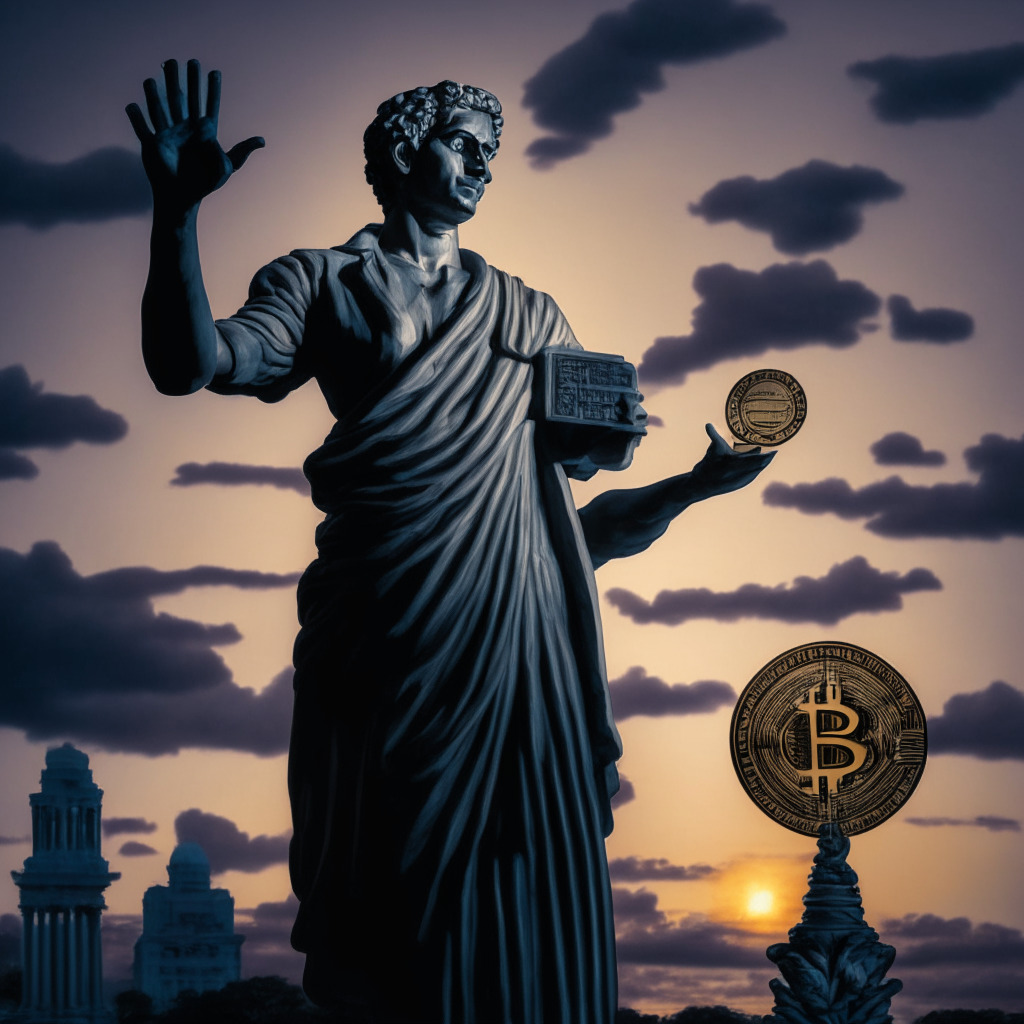“Ex-CEO of lending giant Celsius, Alex Mashinsky, is battling an FTC case against him, arguing the allegations don’t prove fraudulent intent. Key issues involve the Gramm-Leach-Bliley Act requirements and whether Mashinsky, who had resigned, could violate the law. The outcome could set a crypto-lending regulatory precedent.”
Search Results for: FTC
Modernizing Investor Protection: Blockchain, AI, and a National Financial Fraud Registry
“CFTC Commissioner Christy Goldsmith Romero aims to modernize investor protection through technological advances. Acknowledging the need to understand FinTech, cryptocurrency, blockchain and cybersecurity, she urges the implementation of KYC and AML protocols in decentralized finance. She believes federal regulators should utilize social media for tracing funds, crypto activities and issuing necessary warnings against scams.”
Decoding the Potential of a National Fraud Registry: A Shield Against Crypto Scams?
CFTC Commissioner, AdobeChristy Goldsmith Romero proposes a centralized national fraud registry, a one-stop database for regulators to cross-reference misconduct, benefiting investors, law enforcement, and administrations. This registry aims to be a robust deterrent to potential fraudsters and a means to effectively recognize serial offenders.
Crypto Saga: The Mashinsky Case, Legal Frameworks, and Impacts on Industry Innovation
“Alex Mashinsky, former top brass of crypto lender, Celsius, faces charges of fraud and manipulation of the CEL token’s price. This case brings into focus whether 20th-century laws can effectively pursue 21st-century cryptocurrency cases, suggesting a need for legal framework expansion.”
Decoding DeFi: Navigating the Maze of US Regulations and the Promising Blockchain Future
“The US DeFi landscape hit an inflection point as the CFTC filed lawsuits against three companies, accusing them of offering financial products without proper registration. Amidst ambiguity, questions arise about DeFi’s future in the US, regulatory hurdles, and potential to revolutionize world finance. Undoubtedly, for DeFi to truly flourish, regulatory clarity and a willingness to embrace the evolving landscape is crucial.”
The Unfolding Narrative: Crypto’s Potential Influence on the 2024 US Elections
“Cryptocurrency could significantly influence the 2024 United States elections, asserts Brian Armstrong, CEO of Coinbase. Underestimating the crypto voting block could be risky for candidates given the increase in global crypto adoption and impending regulations. Armstrong highlighted that crypto-friendly legislation could pique the interest of mainstream voters, making crypto a hot-button issue in the presidential race.”
Coinbase’s Global Game Plan: Tapping into Foreign Markets Despite US Regulatory Tensions
Coinbase, a global digital asset exchange, plans to expand its operations into Canada, the UK, Australia, Brazil, Singapore, and the European Union, prioritizing these markets due to more progressive digital asset regulations. This decision came after acknowledging restrictive regulations in the US market as a significant impediment. Key strategies for expansion include partnering with banks, payment service providers, and increasing local community engagement.
Stellar’s XLM Experiences Anomalous Surge Amid Potential Announcements and Speculation
“Stellar’s native token, XLM, saw a remarkable 11.5% increase in value within a week, contradicting Bitcoin’s and most altcoins’ downtrends. Stellar Org hinted at an important event on September 12, generating intrigue. Still, speculations surrounding Elon Musk’s possible integration of XLM into social network X are baseless. Meanwhile, Stellar Development Foundation has invested in MoneyGram International.”
Decentralized Finance vs Centralized Finance: Coming Conflict or Synergetic Co-Existence?
“CEO of Binance, Changpeng Zhao, predicts a future where DeFi surpasses CeFi, fueled by his belief in the potential of decentralization. However, the Bank for International Settlements argues that pure DeFi has limited real-world application due to its requirement for centralized oracles.”
Unveiling the Dark Side of Crypto: The MTI Case, Regulatory Challenges and Forward Steps
“CFTC imposed a $1.7 billion fine on Mirror Trading International for fraud, revealing systemic issues plaguing the crypto space. The case emphasizes the necessity for change and serves as a reminder for investors to be wary of potential fraud, misconduct, and market manipulation.”
Navigating the Regulatory Conundrum: A Balanced Approach for DeFi Advancement
Commissioner Summer K. Mersinger raises concerns over CFTC’s focus on enforcement actions rather than engaging with the public and stakeholders when dealing with DeFi technologies. She suggests collaborative rulemaking, regulatory instruments and public engagement can be more effective in managing DeFi’s innovative scope and ensuring market participant safety.
Coinbase’s New Expansion: A Strategic Move or Industry Pressure?
Coinbase, a top crypto exchange, aims to expand to non-U.S. markets, prioritizing countries with clearer crypto regulations. The company’s strategy includes acquiring licenses, setting operations, and registering in these markets. It points to a lack of crypto-forward regulation in the U.S., potentially impacting its influence in the crypto field.
Navigating the Wave: How Binance Battles Rumors, Regulations and Employee Departure
Binance CEO, Changpeng Zhao, has dismissed rumors about financial instability, insisting the platform has “no liquidity issues.” Despite multiple executive departures, Zhao maintains that all customer funds are secure, pointing to recent crypto industry victories and expansions as positive indicators.
Navigating the Crypto Regulatory Tightrope: Balancing Innovation and Investor Protection
U.S. Commodity Futures Trading Commission’s Commissioner, Caroline Pham, calls for a limited pilot program to help the U.S. catch up with crypto-friendly regulatory frameworks. Pham’s proposed program would foster open, transparent, competitive crypto markets while ensuring retail investor protection. The balance between innovation and regulations is crucial for a sustainable crypto future.
The Fall of Celsius: A Cautionary Tale of Blockchain Revolution and Its Risks
“Alex Mashinsky, ex-CEO of the defunct crypto lender, Celsius, faces federal court restrictions due to fraud allegations, including overselling Celsius’ financial health and indulging in risky trading practices. Legal action includes civil lawsuits and a potential $4.7 billion fine. The Celsius saga exemplifies the potential risks and rewards of the blockchain revolution.”
Cryptocurrency Regulation: An Autocratic Approach or the Need of the Hour?
The SEC’s potential favoritism towards traditional banking applications from BlackRock and Fidelity has raised concerns. Following the recent Grayscale case, comments from legal expert Felix Shipkevich suggest the SEC’s controversial regulation methods may unduly affect smaller crypto institutions while benefiting larger firms.
Navigating SEC’s Stance: The Hopeful Resurgence of U.S. Cryptocurrency Industry
The resurgence in the U.S. cryptocurrency industry is driven by key victories by Ripple and Grayscale against the SEC. The shift is largely due to initial clarity from state authorities, conflicting regulatory statements from SEC and CFTC. Amid this, recent positive court filings and decisions may inject fresh liquidity into the market and encourage institutional investments.
Ramaswamy’s Support and Regulatory Challenges: Unraveling the Future of Cryptocurrency in the US
“U.S. Presidential candidate Vivek Ramaswamy praised Grayscale’s victory over the federal securities regulator, asserting it could further Bitcoin and blockchain innovation. However, the legal landscape for cryptocurrency regulation remains complex and uncertain, despite support from industry influencers and active discussions for clear regulations.”
Crypto Commodities: Bitcoin and Ether and their Legal Status in US Courts
U.S. District Court Judge Katherine Polk Failla recently referred to Ether and Bitcoin as “crypto commodities,” dismissing a lawsuit against decentralized exchange Uniswap. The legal classifications of cryptocurrencies continue to vary, with other digital currencies such as XRP classified as a security. Amidst conflicting views, U.S. lawmakers are yet to determine whether SEC or the CFTC will have authority over digital assets. Specialists suggest these legal classifications are crucial for creating a more organized and regulated crypto environment.
Grayscale’s Victory Stirs Up Controversy: Doubts Over SEC’s Gensler Heighten
“Cryptocurrency circles discuss Grayscale’s lawsuit and SEC chair Gary Gensler’s role. Congressman Warren Davidson suggests Gensler’s SEC decisions lack stead, as demonstrated by Grayscale’s legal victory. This opens up possibilities for a Bitcoin spot ETF emergence in the US, but the situation remains uncertain.”
Binance’s Existential Crisis: Will the Crypto Giant Exit Russia Amidst Growing Legal Woes?
“Binance, the leading crypto exchange, is considering an absolute exit from Russia amid increasing Western sanctions. This comes after allegations of enabling transactions related to sanctioned Russian banks, escalating global legal issues, and potential indictments for possible infringement of anti-money laundering laws.”
Visa and Mastercard Sever Ties with Binance: A Shake-up or Just a Ripple in the Crypto Market?
“Payment giants Visa and Mastercard have distanced themselves from Binance amid ongoing regulatory challenges for the leading crypto exchange. Despite this, industry experts predict modest impact on Binance’s market share. The situation illustrates how institutional caution could affect the cryptocurrency market’s future.”
Dominating Stablecoin Market: How Tether Maintains Its Leadership Despite Regulation Tests
“Tether maintains its dominant position in the stablecoin market despite competition and regulatory challenges. With total assets at $86.1 billion, it demonstrates economic robustness, outpacing competitors such as USD Circle, and shows growing appeal among investors while weathering recent regulatory fines and market events.”
Navigating the Regulatory Jungle: Unraveling US Cryptocurrency Rules and Impacts on Market Dynamics
CoinRoutes CEO Dave Weisberger discusses the complexity of cryptocurrency regulation in the United States, criticizing the use of outdated structures for new technologies. He argues for a requisite evolution of regulatory approach, without stifling innovation, warning of the potential loss of American competitiveness in the rapidly expanding crypto industry.
Bitstamp Halts Ethereum Staking for US Clients Amid Regulatory Uncertainty
“Bitstamp has ended its Ethereum staking service for US clients due to increasing regulatory ambiguity. As the SEC struggles to clearly define cryptocurrency statuses, are caught in legal battles with Binance and Coinbase. Ethereum’s classification (as a commodity or security) remains a matter of debate revealing need for transparent regulation.”
Navigating Stormy Waters: Binance, Sanctions and the Quest for Cryptocurrency Regulation
“Binance, a leading cryptocurrency exchange, faces allegations of facilitating transfers to sanctioned Russian lenders. The platform allegedly allowed P2P transactions via institutions like Rosbank and Tinkoff Bank without setting trading limits. Additionally, Binance is tangled in legal issues with regulators like the CFTC and SEC, intensifying concerns around regulatory compliance in crypto transactions.”
Regulatory Compliance and Crypto Exchange: Binance, Checkout.com, and the Premature Contract Termination
“Binance, the world’s largest cryptocurrency exchange, faced contract termination from payment processing giant Checkout.com due to regulatory concerns. Checkout had facilitated billions in crypto transactions for Binance. This termination underscores the impact of regulatory scrutiny on even the most lucrative partnerships within the crypto industry.”
Celsius Asset Sale: Bankruptcy, Scandal, and the Potent Future of Self-Regulated Crypto
In the saga of the troubled crypto lender, Celsius, a vote on the firm’s asset sale proposal to the Fahrenheit consortium is approaching. The court approval of the proposal indicates that creditors could recoup between 67% to 85% of their investments, amidst ongoing turbulence including former CEO, Alex Mashinsky’s contentious arrest, and a hefty FTC fine.
Coinbase Achives Unprecedented U.S. Regulatory Milestone: Boom or Bust for Crypto Industry?
The U.S. Commodity Futures Trading Commission (CFTC) has granted Coinbase unprecedented authority to handle bitcoin and ether futures, marking it as the first crypto company to receive registration as a futures commission merchant. This significant development indicates robust systems for capital, disclosures, record-keeping, and customer fund segregation, and it might influence how ether and similar commodities navigate the U.S. regulatory regime. However, concerns arise about potential market manipulation and the impact on other crypto-native companies.
Bitcoin Slips Amidst Wall Street Woes: PayPal Halts UK Crypto Trades & Jada AI Secures Funding
“The Bitcoin value recently slipped to its lowest since June 21, trading just above $28,346, related to Wall Street’s drop caused by banking apprehensions and interest rate fears. Meanwhile, PayPal suspended crypto purchases in the UK until early 2024 due to new FCA regulations, but continues its crypto push in the US.”
Bearish Wagers and Bullish Endeavours: Navigating Bitcoin’s Latest Slump Amid Macroeconomic Woes
“The flagship cryptocurrency, BTC, is currently embroiled in a surprising pullback amidst market apprehensions sparked by banking sector worries and a potential recession in China. Meanwhile, leverage funds have increased bearish wagers in cash-settled Bitcoin futures, indicating a possible shift of sentiment in the crypto space.”
Coinbase’s Leap into Futures Trading: A Revolutionary Stride or Regulatory Hurdle?
Coinbase, a major cryptocurrency exchange, has secured approval from the National Futures Association to offer cryptocurrency futures trading in the United States. This will allow Coinbase to launch futures contracts for Bitcoin and Ether, potentially making the U.S. a global leader in digital innovation. Despite facing legal disputes with the SEC, the company remains committed to contributing to the crypto industry.































